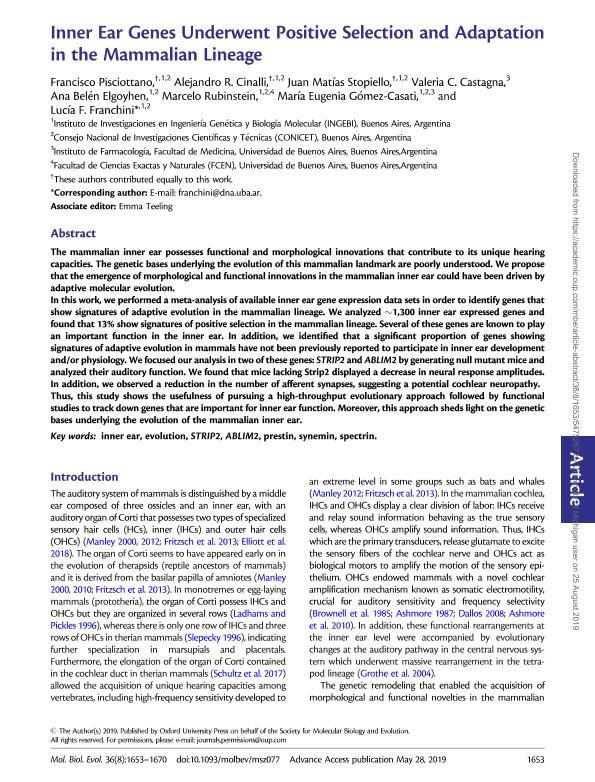Artículo
Inner Ear Genes Underwent Positive Selection and Adaptation in the Mammalian Lineage
Pisciottano, Francisco ; Cinalli, Alejandro Raúl
; Cinalli, Alejandro Raúl ; Stopiello, Juan Matías
; Stopiello, Juan Matías ; Castagna, Valeria Carolina
; Castagna, Valeria Carolina ; Elgoyhen, Ana Belen
; Elgoyhen, Ana Belen ; Rubinstein, Marcelo
; Rubinstein, Marcelo ; Gomez Casati, Maria Eugenia
; Gomez Casati, Maria Eugenia ; Franchini, Lucia Florencia
; Franchini, Lucia Florencia
 ; Cinalli, Alejandro Raúl
; Cinalli, Alejandro Raúl ; Stopiello, Juan Matías
; Stopiello, Juan Matías ; Castagna, Valeria Carolina
; Castagna, Valeria Carolina ; Elgoyhen, Ana Belen
; Elgoyhen, Ana Belen ; Rubinstein, Marcelo
; Rubinstein, Marcelo ; Gomez Casati, Maria Eugenia
; Gomez Casati, Maria Eugenia ; Franchini, Lucia Florencia
; Franchini, Lucia Florencia
Fecha de publicación:
08/2019
Editorial:
Oxford University Press
Revista:
Molecular Biology and Evolution
ISSN:
0737-4038
Idioma:
Inglés
Tipo de recurso:
Artículo publicado
Clasificación temática:
Resumen
The mammalian inner ear possesses functional and morphological innovations that contribute to its unique hearing capacities. The genetic bases underlying the evolution of this mammalian landmark are poorly understood. We propose that the emergence of morphological and functional innovations in the mammalian inner ear could have been driven by adaptive molecular evolution. In this work, we performed a meta-analysis of available inner ear gene expression data sets in order to identify genes that show signatures of adaptive evolution in the mammalian lineage. We analyzed ∼1,300 inner ear expressed genes and found that 13% show signatures of positive selection in the mammalian lineage. Several of these genes are known to play an important function in the inner ear. In addition, we identified that a significant proportion of genes showing signatures of adaptive evolution in mammals have not been previously reported to participate in inner ear development and/or physiology. We focused our analysis in two of these genes: STRIP2 and ABLIM2 by generating null mutant mice and analyzed their auditory function. We found that mice lacking Strip2 displayed a decrease in neural response amplitudes. In addition, we observed a reduction in the number of afferent synapses, suggesting a potential cochlear neuropathy. Thus, this study shows the usefulness of pursuing a high-throughput evolutionary approach followed by functional studies to track down genes that are important for inner ear function. Moreover, this approach sheds light on the genetic bases underlying the evolution of the mammalian inner ear.
Palabras clave:
ABLIM2
,
EVOLUTION
,
INNER EAR
,
PRESTIN
,
SPECTRIN
,
STRIP2
,
SYNEMIN
Archivos asociados
Licencia
Identificadores
Colecciones
Articulos(INGEBI)
Articulos de INST.DE INVEST.EN ING.GENETICA Y BIOL.MOLECULAR "DR. HECTOR N TORRES"
Articulos de INST.DE INVEST.EN ING.GENETICA Y BIOL.MOLECULAR "DR. HECTOR N TORRES"
Articulos(OCA HOUSSAY)
Articulos de OFICINA DE COORDINACION ADMINISTRATIVA HOUSSAY
Articulos de OFICINA DE COORDINACION ADMINISTRATIVA HOUSSAY
Citación
Pisciottano, Francisco; Cinalli, Alejandro Raúl; Stopiello, Juan Matías; Castagna, Valeria Carolina; Elgoyhen, Ana Belen; et al.; Inner Ear Genes Underwent Positive Selection and Adaptation in the Mammalian Lineage; Oxford University Press; Molecular Biology and Evolution; 36; 8; 8-2019; 1653-1670
Compartir
Altmétricas



